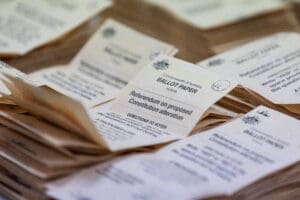
Child Support in Texas, United States of America
As of 1 September 2023, the State of Texas has given effect to House Bill 393, confirming that any person who is convicted of intoxication manslaughter will now have to pay restitution. In other words, this means that guilty persons convicted of drunk driving in Texas, will now have to pay child support if they kill a parent or guardian of a minor.
Known as ‘Bentley's Law’, the legislation was enacted to make drunk drivers financially accountable for the expenses associated with raising a family when an earner of that family is killed. The legislation also hopes to deter drivers from driving whilst intoxicated by demanding even greater consequences on perpetrators.
Under Bentley’s Law, perpetrators will continue to pay child support until the child is no longer a minor – meaning they must either turn 18 years of age or graduate high school – which ever is later. These payments are not an alternative to incarceration, in fact perpetrators will be required to make such payments despite being in prison. If a person cannot make these payments due to being incarcerated, they must make the payments no later than a year from their release. Bentley's Law also provides the option for perpetrators and victims to come to an agreed payment plan.
In Australia, offenders of drunk driving may be liable to pay compensation to their victims, including pedestrians, cyclists and passengers of other vehicles, or for clearly identifiable damages and loss, such as damage to another vehicle. However, the requirement by law in Australia does not, and may not for the foreseeable future, require a payment of child support from guilty parties.
Child Support in Australia
This raises the question as to how does child support work in Australia?
What is Child Support?
Child support in Australia refers to payments made between separated parents to help with the costs associated with raising their children. This is done so that both parents can continue to contribute to the lives of their children. Child support payments may be made from one parent to another, or even by both parents to a ‘non-parent carer’, such as a grandparent, with whom the child may reside (for at least 128 nights per year).
Types of Child Support
Child Support in Australia is run by the Australian Government’s Child Support scheme via Services Australia. Within Services Australia, parents may apply for a ‘Child Support Assessment’, whereby the service will determine the payment costings and manage the transfer from parent to parent. In a simplified explanation, Services Australia does so through their ‘8 step Formula’ which considers the parent’s annual salary of each parent and percentage of care, to procure the child support amount.
On the other hand, parents may elect to ‘self-manage’, which means that they are able to chose and manage how much they pay, at what intervals and through which channels. However, parents are only eligible to receive the base rate of Family Tax Benefit Part A, which is a lower amount.
If you have any questions about Child Support, please do not hesitate to contact our offices on (02) 8917 8700.

The way children are raised is significantly dependent on the sociocultural influences around them, and a contentious issue that is often discussed is the use of physical punishment on children as a form of discipline.
The NSW Law
Under the Crimes Amendment (Child Protection - Physical Mistreatment) Act 2001 No 89 (NSW), the use of excessive physical force to punish children is limited, and only specific parts of a child’s body can be subject to force. Further, Section 61AA of the Crimes Act 1900 (NSW), in criminal proceedings brought against a person arising out of the application of physical force to a child, there is a defence of “lawful correction” if the physical force was applied by a parent for the purposes of punishment, and that the physical force was reasonable having regard to various factors including age, health and maturity. The defence will not however be available if the Court determines that the force was applied to any part of the head or neck of a child or to any other part of the body of a child in such a way as to be likely to cause harm to a child that lasts for more than a short period.
Effect on Children
Whilst there are laws surrounding the extreme use of physical force against children, corporal punishment is highly prevalent globally and there is often no legislation effectively regulating the extremity that some children may experience. The World Health Organisation found that around 60% of children aged between 2 and 14 regularly experience physical punishment by their parents or caregivers, and evidence shows that this not only increases children’s behavioural problems, but also links to a range of life-long negative outcomes such as mental illness, increased aggression, and impaired socio-emotional development. Further, the American Psychological Association has proposed alternative ways to resolve child behavioural issues that do not involve conflict, including taking away certain privileges, using praise to shape behaviour, or ignoring the behaviour.
Should you wish to discuss this matter further, please do not hesitate to contact our offices.
A cruise with 28 deaths and more than 600 victims of COVID-19; the Federal Court has made it’s decision.

In March 2020, the Ruby Princess Ship set for departure carrying “a significant risk of a coronavirus outbreak, with possible disastrous consequences, and yet they proceeded regardless”, as said by Justice Stewart of the Federal Court.
Despite COVID-19 outbreaks on two previous ships, Carnival Australia confirmed to passengers their reassured safety prior to departure. Later found to be a misleading representation of reasonable safety.
The lead applicant, Ms Susan Karpik, and also one of many applicants in the class action lawsuit against the cruise, suffered psychiatric injuries as her husband was hospitalised for COVID-19, including having to be placed into an induced coma. Ms Karpik sought damages in the sum of $360,000 for personal injury, distress, and disappointment. Unfortunately, the lead applicant was only able to recover $4,400, which had already been covered by a refund provided by the cruise ship. Judge Stewart reasoned that her case was below the claimable threshold as she did not satisfy suffering from long COVID.
Nonetheless, the class action has been regarded as the first successful cruise ship class action as the court is now to answer to each passenger and their proof of individual damages. This would include the tragic injury suffered by Ms Karpik’s husband, who is likely to recover damages due to the substantial claim.
Ultimately, Carnival Australia was found negligent due to misleading passengers with claims of reasonable safety, not providing a “happy and relaxing holiday” as advertised, and breaching their duty of care to every passenger’s personal health and safety.
It is predicted that Carnival Australia may settle all claims outside of Court, given the expected lengthy litigation and legal findings behind each claim.
In the meantime, the matter has been listed for case management hearing an Final Order on 10 November 2023.
If you or someone you know wish to discuss this issue further, then please do not hesitate to contact us on 02 8999 9809.
Excessive use of police powers in social justice contexts has been the topic of public criticism on numerous occasions, with respect to the impediment of individual rights to protest and right to privacy.
These concerns arose once again, ahead of the pro-Palestinian rally held on 15 October 2023 in Hyde Park, Sydney CBD. Comments by the NSW police Acting Commissioner, David Hudson, and NSW Premier Chris Minns advocated the use of “extraordinary powers” to search protesters without reason and arrest and charge those who refuse to identify themselves at Sunday’s planned pro-Palestinian rally.
Emergency Powers under Part 6A of the Law Enforcement (Power and Responsibilities) Act 2002 (NSW)
Introduced following the 2005 Cronulla race riots, these powers in Part 6A of the Law Enforcement (Power and Responsibilities) Act 2002 (NSW) assist police in defusing and controlling large-scale public disorder. The powers are enlivened when the threshold of an ‘actual or threatened large-scale public disorder’ is met. While what constitutes ‘large-scale’ is left ambiguous in the legislation, a ‘public disorder’ is defined in Part 6A as a ‘riot or other civil disturbance that gives rise to a serious risk to public safety, whether at a single location or resulting from a series of incidents in the same or different locations’. Once approved by either the Commissioner of Police, Deputy Commissioner or Assistant Commissioner, the powers enable the NSW Police Force to undertake a range of actions, including some of the following.
Section 87I - Power to place or establish cordon or roadblock
This power enables the police to establish a roadblock or place a cordon around a target area, for the purpose of stopping and searching people involved in the 'large-scale public disorder' or to prevent persons from entering or leaving the area without the permission of a police officer.
Section 87K - Power to search persons
Bodily searches without reasonable cause are authorised under this section, if a person is in an area where the power is authorised. A person can be detained by a police officer for as long as reasonably necessary to conduct a search.
Section 87L - Power to obtain disclosure of identity
Individuals in an area where use of the emergency powers are authorised, must disclose their identify if requested by a police officer to do so. Refusal to do so without a reasonable excuse will result in a fine or 12 months imprisonment.
Use of the Powers in the Context of Peaceful Protest
Violent behaviour and the chanting of antisemitic slurs at the earlier pro-Palestine rally in front of the Opera House on Monday were the primary justifications for use of the extended police powers. Notably, in the Parliamentary debate on the Part 6A emergency powers and Second Reading Speech, it was unequivocally affirmed that the powers would not be used in the policing of peaceful rallies and demonstrations. However, the Legislative Review Committee’s review of the Part 6A powers included criticisms that the right to peaceful assembly and right to privacy were affected by the extended powers (NSW Ombudsman, Review of Emergency Powers to Prevent or Control Disorder).
While the rally on Sunday was originally planned as a march, the failure of the organisers to submit a form for the protest 7 days in advance meant that the event was changed to a static rally. Reports following the rally confirmed that while over 6,000 people gathered, no arrests were made. Notwithstanding the positive and peaceful outcome of the event, it is important to keep note of the potential imbalances between the extension of police powers for public safety, against individuals’ rights to peaceful assembly and privacy. If arrested, individuals will often be required to participated in a police interview. It is important to note that individuals under arrest reserve the right to remain silent, and to seek independent legal advice before answering any questions.
If you or someone you know wish to discuss this issue further, then please do not hesitate to contact us on 02 8999 9809.
Appeals are applications to higher courts by a party who believes that the decision at first instance was incorrect. Appellate work is a special area of law and usually requires specialist lawyers who are knowledgeable in the area of appeals. Appeals are primarily heard and determined in the Federal Court in its appellate jurisdiction.
Jurisdiction
Across Australia, numerous courts have a specific ‘jurisdiction’, which refers to the scope of a Court's power to decide on a particular issue. This will usually depend on the purpose for which a Court was established and is typically defined within the legislation establishing said Court. Jurisdiction is often determined based on the location of the Court, the type of parties to a case or subject matter, the amount of money in the dispute or the penalties that can be handed down. Other Courts may also have a specific jurisdiction, like the Children’s Court or have a broader general jurisdiction, like the Supreme Courts of the states and territories. The distinction between jurisdictions also applies to the time a case is heard. If it is the first time that a matter is heard, then that will mean the Court at first instance is hearing a matter in its ‘original jurisdiction’. Whereas if a matter is heard a second time against the decision made by a Court in the original jurisdiction, the Court hearing that matter again will have ‘appellate jurisdiction’.
The appellate jurisdiction of the Federal Court of Australia includes:
- Appeals for decisions by a single judge of the Federal Court exercising its original jurisdiction.
- Appeals from other Courts in some circumstances. E.g., the Supreme Court of the Australian Capital Territory or Northern Territory (Section 24 of the Federal Court of Australia Act 1976)
- Fair Work appeals
- Appeals from decisions of the Federal Circuit and Family Court of Australia
Appeals sometimes reach the High Court of Australia; however, there is no automatic right to do so. An individual may apply to the High Court for permission to appeal, called a ‘special leave’ application. However, this is only granted in the most exceptional cases.
Types of Appeals
Strict Appeals: Where a Court with appellate jurisdiction determines whether the Court at first instance made a mistake, and it will be constrained to only considering evidence that was available to the first Court.
Rehearing Appeals: Where the appellate Court will consider the law at the time of the appeal and any events leading up to it. Here, fresh evidence can also be brought in.
Appeals De Novo: Where the appellate Court retries all the issues heard at first instance with the opportunity to consider fresh evidence. Each party will be able to present their case, and the Court will hear the whole matter and is not constrained to only reviewing the decision of the first Court.
Types of Review
Merits Review: This applies to decisions by government agencies rather than by the Courts. This right is created by legislation where a person is directly affected by the decision of a government agency and thus allows for the decision to be reviewed by other government officials.
Judicial Review: This is a common law right, meaning it is not derived from legislation. This applies to a higher appellate court, whether it is a decision by a government agency or by a lower Court or Tribunal. Traditionally, the grounds that can form the basis of a judicial review application include:
- That a decision was beyond the legal power of the decision maker (the decision was ultra vires)
- The decision was made in breach of procedural fairness.
- There was a jurisdictional error on the part of the Court or Tribunal where Courts decide over a matter without jurisdiction.
- There was an error of law on the face of the record (a mistake was made in the record of the decision rather than the reasoning)
Appealing Discretionary Decisions
Some decision-makers in particular areas of law (e.g., family law, immigration law, probate law) have discretionary power. This means they can decide on a matter by making a judgment and considering all relevant information on a case-by-case basis. With discretionary powers, the decision maker has the choice of either choosing to exercise a particular power (or make a particular decision) or not. Conversely, some decision-makers have mandatory powers where they have an obligation to exercise a particular power in a certain way. Appealing a decision by a decision maker with discretionary powers is different to usual appeals.
In 1936, the High Court laid down the principles of appealing the decision of a discretionary decision maker in the case of House v The King (1936) 55 CLR 449. Justices Dixon, Evatt and McTiernan identified four grounds on which a party may make an appeal:
- The decision maker considered irrelevant material.
- The decision maker failed to consider relevant material.
- The decision maker made a mistake of fact; or
- The decision was unreasonable or wholly unjust.
The case determined that a person seeking an appeal must establish that the decision maker made an error while exercising their discretion. These grounds are known as ‘House Errors’ and continue to be used today. The grounds identified in this case can be applied to cases in criminal law, civil penalties, family proceedings, costs, valuation of property, quantum of damages and more.
If you or someone you know wish to discuss this issue further, then please do not hesitate to contact us on 02 8999 9809.

A referendum was held on 14 October 2023, where Australians were asked whether they would like to change the Constitution to recognise the First Peoples of Australia by establishing an Aboriginal and Torres Strait Islander Voice.
As at 2023, there have been 45 nationwide referendums, with only 8 of which have been carried out. For a referendum to be successful, there needs to be a ‘double majority’ vote of ‘yes’ to the proposed change, meaning that at least 4 out of 6 states should have a majority of votes. The 2023 referendum saw that no state in Australia voted ‘yes’ for the Voice to pass, with more than 60% of Australians voting ‘no’ to the constitutional alteration. However, in remote Aboriginal communities, there was an overwhelming vote in favour of the Voice, with support being close to 90%.
Many Yes campaigners were devastated in this result, stating that the referendum loss was due to the abundant misinformed campaigning and the entrenched racism within our society.
PM Anthony Albanese said the failing of the referendum "is not the end of the road" for attempts to address the disadvantages facing Aboriginal and Torres Strait Islander people.
If you or someone you know wish to discuss this issue further, then please do not hesitate to contact us on 02 8999 9809.
Privacy Laws - what are they?
The Privacy Act 1988 (Cth) promotes and protects the privacy of individuals by regulating how Australian government agencies and large organisations (with an annual turnover exceeding $3 million) handle personal information.
Despite the significant changes to the distribution, accessibility and use of personal information by government agencies and corporations in the turn of the digital era, major privacy reforms have only been implemented in 2014. The immense quantity of data flow in digital ecosystems have created the conditions for recent major data breaches, and exposed Australians to a high risk of identity fraud and scams.
As highlighted in the Privacy Act Review Report by the Attorney-General’s Department, Australia’s existing privacy laws are quite disparate from leading privacy laws on the global scale. Accordingly, the Australian Government’s response to the Attorney General’s Department’s review of the Privacy Act 1988 (Cth) outlines a crucial set of proposals that are critical to ensuring Australia’s privacy framework is strengthened for the future. The Australian Information Commissioner and Privacy Commissioner, Angelene Falk, noted that “this is the most significant change to the Privacy Act in decades, and will require organisations to ensure that their practices are fair and reasonable”.
The proposed changes and their consequences for you
The consequence of the reforms to be implemented in the Privacy Act will be multifaceted, impacting consumers, business, government and the broader economy.
One of the fundamental developments is the ability for individuals to exercise new privacy rights and take direct action in the courts if their privacy is breached; greater autonomy is therefore provided to consumers, and a higher level of accountability for agencies and organisations who misuse the handling of sensitive information.
Additionally, potentially updated definitions for terms such as “personal information” and “consent” will increase the currently available protections for consumers against intrusive and manipulative data practices.
Along with changes to the definition of “consent”, the addition of a “fair and reasonable test” to assess whether a practice is substantively fair, ensures that companies with inappropriate data practices cannot claim that such practices are lawful simply because consumers provided consent.
Furthermore, the proposals include a greater range of enforcement powers to be provided to the OAIC, and expand the scope of orders able to be made by the Court in civil penalty proceedings.
Although issues with the protection and use of privacy information are inevitable in the digital age, the oncoming reforms to Australia’s privacy laws are an important start to the protection of individual’s personal information and accountability of companies and organisations that misuse such information.
If you or someone you know wish to discuss this issue further, then please do not hesitate to contact us on 02 8999 9809.

As a new client to a Family Law practice, you will often be asked an array of questions before your initial consultation such as ‘what is your partner’s name’. Whilst this may seem arbitrary or unnecessary, questions like these serve a great purpose. By confirming the other party’s details before their consultation, new client’s allow law firms to conduct Conflict of Interest checks to ensure that their partners have not been acted for, currently, or even in the past.
Of course, Freedman & Gopalan Solicitors, and all other law firms in New South Wales, welcome all. However, in order to maintain the highest level of professional conduct, all law firms and solicitors must abide by rules set out by the Legal Professions Act 1987 – Rules. Accordingly, per rule 3 of the Act, ‘a practitioner must not accept a retainer to act for another person in any action or proceedings against, or in opposition to, the interest of a person (a) for whom the practitioner or the firm…has acted previously; and (b) from whom the practitioner or the practitioner’s firm has thereby acquired information confidential to that person and material to the action or proceedings; and that person might reasonably conclude that there is a real possibility the information will be used to the person’s detriment’.
So, What Does This Mean?
In plain terms, rule 3 means that a legal practice cannot act against a person for whom they have acted in the past and from whom they have gained confidential information from, pertaining to the matter at hand. For instance, if a lawyer has past knowledge of confidential information provided to them by person A, they should not act against this former client if Person A’s partner, Person B wishes to retain their services, as this would create an unfair advantage.
The legislation uses the phrase, ‘a real possibility the information will be used to the person’s detriment’. This demonstrates that the goal of this rule is to protect clients from having information which they shared in confidence, used against them in proceedings.
Why is this Important for Law Firms?
Proceeding forth with a client, despite a clear conflict of interest constitutes as unsatisfactory professional conduct, which is defined by section 296 of the Legal Profession Uniform Law (NSW) as an act (or omission) occurring in connection with the practice of law that falls short of the standard of competence and diligence that a member of the public is entitled to expect of a reasonably competent legal practitioner. As such, providing a questions or forms to initial clients is imperative to ensuring law firm’s carry out their due diligence, and means that existing or previous clients do not have to fear when sharing information with their solicitors.
Where do we Draw the Line?
At first, the standard to which a conflict of interest is held, was explained in McMillan & McMillan [2000], whereby the Full Court said, “the client only need to give evidence that he has provided confidential information to the solicitor… the client does not have to divulge the content of that information”. This is enough to establish a ‘theoretical risk’ that information may be used to disadvantage said client.
However, in 2015, the court in Osferatu & Osferatu proposed that the theoretical risk is too narrow, and that rather, a ‘real possibility’ needed to be established. This means that there needs to be evidence to support whether any confidential information has actually been disclosed.
Finally, the Family Court is a discretionary jurisdiction, meaning that the discretion of the presenting judge dictates which approach is taken, and based on context, understanding and perception, the conflict of interest can either be proven or disproven. Whatever the outcome may be, it is important for law firms and solicitors to exercise professional rules and their duties of fairness and confidentiality, and not represent a party whom is in opposition to a past client.
New South Wales drug law will be dramatically changed by new laws that divert individuals caught with small amounts of illicit substances away from the Courts. The recent changes will create a ‘two-strike’ process whereby individuals who are caught by Police with small quantities of illegal drugs for personal use will be issued with a fine rather than be sent to Court for a hearing.
This change comes after criticism of NSW drug law schemes being too harsh on those who possess small quantities for personal use only. Ryan Park, the NSW Health Minister, has commented that drug use is a health issue, and thus, the same is better addressed through health support rather than the criminal justice system. This change in NSW starts to fall in line with that of the ACT, where the Labour-Greens government also decriminalised the possession of small quantities of drugs. Interestingly, in September, NSW Premier Chris Minns commented following the change in the ACT that there were no plans to contemplate drug decriminalisation in NSW and that if he were to be voted in again, such conversations would occur afterwards. However, many MPs, along with many community members, were disappointed by this since there is an understanding that the hard stances against drugs in the past have only increased drug-related deaths.
Currently, individuals who are found guilty of possessing drugs have to attend Court and can face up to two years imprisonment or a fine of up to $2000.00. Under the new laws, Police officers will have the power to issue a Criminal Infringement Notice amounting to $400.00 to adults caught with small quantities of drugs for personal use on two occasions. Individuals could choose to pay the fine, or they will be given the opportunity to complete a drug and alcohol intervention where they will be eligible to have the issued fine wiped. While it is not mandatory for the Police to issue a fine, this power will be at their discretion to be used when they deem it an appropriate alternative to issuing a Court Notice.
These new laws will bring NSW in line with the other Australian states and territories and are also in agreement with what many experts in the area of drug law have stated and with the findings back in February 2020 by the Ice Inquiry led by Dan Howard. The Inquiry recommended a complete decriminalisation of drug possession in NSW, introducing pill-testing music festivals and abolishing drug dogs. The previous government took over two years to respond to these findings as there was a significant disagreement in the Cabinet regarding the suggested changes. Despite the changes to how individuals will be dealt with when in possession of small amounts of drugs, the government still maintains a hard stance on rejecting the proposal to run a pill-testing trial now that we are in the festival season. This is even so after the deaths of two young men and ten more people hospitalised after a festival at the beginning of this month.
Despite the many changes that are required in the area of drug law, this is an essential step in the right direction and hopefully the beginning of many. Yasmin Catley, the Police Minister, has stated that the new scheme will lead to better outcomes for low-level offending without compromising safety. This change will also align NSW with other Australian states and territories and is welcome by many nationwide.
